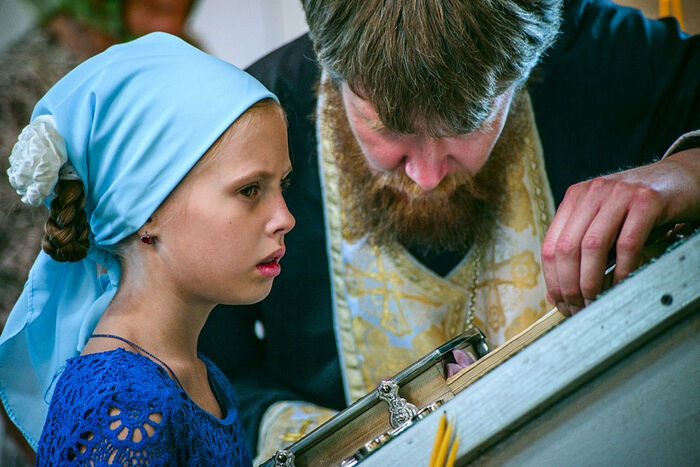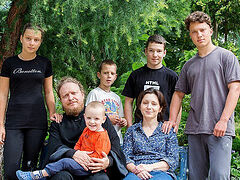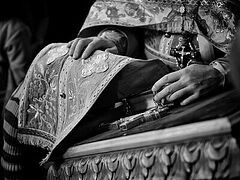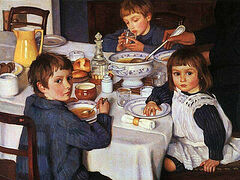How to prepare your child to have confession for the first time? Why do teenagers leave the Church and what you should do to avoid it? Who plays the pivotal role in the spiritual upbringing of children: the priest or the parents? How to protect your child from spiritual burnout and habituation?
We asked Archpriest Andrei Ovchinnikov, the author of a great number of conversations about family life and himself the father of seven children, to answer these and other questions.
—We can often see the nervousness and even some kind of trepidation among the moms in the parish, as soon their first-born (it is precisely the first-born, not a third or fourth child) reaches the age of seven and prepares to have his first confession. How and why is it important for a Christian, a really young one in particular, to have his very first confession under the priest’s epitrachileon?
It would be really nice if dads took care of getting their children ready to have confession. And it wouldn’t even matter whether that was a son or a daughter
—You noted that it mostly worries the women, the “mommies.” It is quite disheartening to know that dads aren’t there at it, because the confessing priest must see that the head of this family is in charge of the children’s upbringing. It would be really nice if dads took care of getting their children ready to have their confession. And it wouldn’t even matter whether it was a son or a daughter. Because moms handle the child’s preparation for confession in a rather particular manner. To begin with, a mother always tries to make her child feel comfortable, secure, and confident. On the one hand, there is nothing wrong about this. But on the other hand, a mother creates a specific artificial environment—sure, it is very comfortable for a child, but it isn’t what can be implemented in reality at all times.
Our family never had any special preparatory stages before the first confession. Everything rolled down towards it quite smoothly.
The children are getting older, they no longer need to be carried to church, and they have to get ready to take serious steps there. Confession is an important preparatory stage before the Mystery of Communion. If both parents are serious about their chidren’s upbringing, then the first confession actually happens long before the first official church confession. “What is good and what is bad?”—should be a perennial topic of conversations in the family. Naturally, if the parents speak to their children about the dangers of lying, being lazy and cunning, acting up or throwing tantrums long before they reach the confession-ripe age of seven, then it is easily projected onto a confession. Thus, there will be no reason to worry about it.
The child comes to confession and we see the fruit of his upbringing. If he was truly brought up in faith, he would repent consciously, oftentimes quite profoundly and deeply. But if the family treats it as a certain act—simply as “just come up to batiushka and say something”—we can see that, too.
What do children repent about? They threw tantrums and didn’t obey. Two sins. Parents often pay no attention to the fact that their child spends hours on the phone, that he is lying already, or acts as an egoist who never helps at home. But they fail to notice the deep-seated things, and they work with their children only on those issues that lie on the surface.
If no one brings up the children at home, they will, without doubt, remain silent throughout the confession
That’s why I’m all for the simplified preparatory stage of confession for children. You did something wrong—go and confess, repent of what you have done wrong. But if no one brings up the children at home, they will, without doubt, remain silent throughout the confession. Because they won’t know what to say.
—We often see during confession that a child reluctantly reads his sins from a piece of paper. Besides, it often happens that the sins are dictated by his parents. Is it practicable and to what extent?
—It is a huge pedagogical mistake when the children, still small, are forced or made to do it. Because once they turn thirteen or fourteen, they will simply rebel and quit going to church altogether.
You see, we practically have no teenagers at church. It is the result of the so-called “mommy-driven upbringing,” when mothers make a pretense of being religious, but, in fact, they fail to bring up their children in the faith. That’s why, once the child reaches adolescence and grows in his ability to seriously comprehend the Christian way of life, he is often unwilling to put on airs and drifts away from the Church. It may sound harsh, but this problem does exist.
We only see children, and the young people who got burnt in life, or faltered and suffered hardship. They, like prodigal sons, suddenly recall that they should return to the Church. The fact we don’t have any teens in our churches is the result of our upbringing.
I would advise against playing down or tiptoeing around your child’s perception of sins. In our family, the children say little about their sins. But I know that when they go to confession, they will have things to repent for. The habit of soul-searching is an extremely important quality.
If, at the end of the day, you are able to write down a few sins you have committed, then you live thoughtfully
Generally, writing sins on paper is a good habit, especially when you are only beginning your life as a Christian, or when you are a child. If, at the end of the day, you are able to write down a few sins you have committed, then you live thoughtfully, assessing your words and actions and keeping track of your mistakes and sins. Then, at the end of the week, you need to break the list down to define the specific sins and confess them before a priest. In this case, it is a worthy practice.
—Unfortunately, we can see that, in modern families, it is the mother who takes care of her daughter’s upbringing, and the father brings up the sons…
—I would impose a strict penance on such parents: I’d have them do prostrations.
We should organize parochial courses on the basic Christian upbringing of children with the help of parents with large families. Because people are unable to educate their chidren. Not only that, but they don’t want to, and can’t. As a result, we see all kinds of deviations in Christian upbringing. On the outside—a touch of churching, but on the inside—an empty shell, oftentimes, hiding the somewhat rotten traits of a human character that no one has ever cultivated.
There are, unfortunately, a lot of such sad examples even among those who study at seminaries and prepare for ordination. Modern young men no longer display the qualities that should lie at the basis of a Christian education: integrity, honesty, diligence, and unselfishness. What is the reason behind it? The reason behind it is the missing years of upbringing, when the children should have been taken care of, day in and day out, receiving home education, led by example, and never allowed to play things down.
—It often happens that the parents are trying to find a special “kid-friendly” batiushka, a particularly gentle father confessor, for their beloved offspring. Is there a need to do this?
—I think a priest has to create a comfortable environment for anyone who comes to confession: not only a child, but an adult as well.
The work of a confessor involves creating a comfort zone, so that anyone who comes for confession feels at peace, at ease and has no fear talking about his mistakes and sins. Because a Christian doesn’t confess to a priest, but to God.
Seek out the priests just like you’d search for a teacher, or a doctor; try to find someone who doesn’t play the role of a shepherd, but lives it
Sadly, our priests can’t always provide this level of spiritual comfort. It is awful that there are only a select few we can entrust our children to, or who wouldn’t cause any harm. It was among one of the favorite subjects for Archimandrite John (Krestiankin): seek out priests just like you’d search for a teacher, or a doctor; try to find someone who doesn’t play the role of a shepherd, but lives it.
—How should parents behave after their child’s confession? Some are practically burning with curiosity: so to speak, “What did my child tell the priest? How did the priest respond?”
—Don’t disturb him. Don’t dig into his soul. He confessed—glory to God that he did. There is no need to ask about anything. When he goes to the next confession, he will say more.
What is the main rule of upbringing? Bend the child’s will gently, but systematically and firmly, keeping the focus on achieving those lofty goals. This work is of paramount importance!
Even though I said that we should bring up children gently, doing it is not quite easy, and it even causes pain. For example, we need to teach the child to get up early to say morning prayers, to put away his toys, to make his bed, or wash dishes after himself. The parents should keep communicating these messages and thus train the children to make small sacrifices. Little by little, it will bring the first fruit.
Who can boast of succeeding in tearing their kids away from a computer, a smartphone, or video games?!
Next, we should tell our children that they should watch what they are saying and be polite and thankful. A separate topic is the smartphone, today’s “weapon of mass destruction.” Who can boast of succeeding in tearing their kids away from a computer, a smartphone, or the video games?!
Somehow, we have made it a rule to shift the greater chunk of responsibility onto the priest. Let Batiushka, so to speak, mend the child’s ways. Look, we can only tweak what the parents have done in terms of upbringing. All we can do is help and tweak it. The greatest burden of the responsibility lies solely on the child’s parents.
—When our child was still small, we liked playing a game of “My firsts.” At the end of every day, we discussed how his day went. The child explained about the new things he had learned, and what he had done wrong or where he had failed to succeed. But, before he reached the age of six, I noticed that he started to tell fibs in hopes of looking better and smarter. The same happens during confession when they want to look better than they really are and conceal certain things. How can we help our children learn to be true to themselves, and to never be afraid of an unsparing assessment?
—If he lies, he lies everywhere, at home and at church. The parents should work with the child. If those lies are brought to light, when he, for example, intentionally skipped classes, or took the candy from the kitchen cabinet, or surfed the net, even though it was prohibited, and then the parents had a talk with him, what were the consequences? The child goes and confesses to a priest.
We priests only record this or that misstep, but it is too difficult to make a difference. There are people, especially young children, who are deceitful during confession, and in such an instance, they obviously want to look better than they really are. Parents should know and work with what lies hidden inside their children’s souls.
Why do I keep saying, “parents this, parents that”? Because ninety five percent of a child’s upbringing is the parents’ responsibility
Why do I say repeatedly, “parents this, parents that”? Because ninety five percent of a child’s upbringing is the parents’ responsibility. If a child grows up a believing Christian—his parents get the credit, not the priests. The priests’ job is to straighten things out and support, and to say that your dad and mom are the ones who bring you up to be a good person, so keep on living this way.
We often have people asking: “What should we do?” To some parents, it is about their kids suffering from drug abuse, to others it’s gaming, and then there are some who took up cohabitation, etc. etc. How can we help? By praying. The time lost and the timely efforts of correction not taken by parents can’t be fixed. I am a pessimist in this respect, because, at this point, we already face a rather dreadful situation.
But how cute all those kids are at the beginning! However, take note, all of them are young, and we are talking about five to seven or nine year olds. And what about the happily grinning teens? Or, even the ones not grinning happily? They are simply gone from our churches. Sure, we enjoy seeing babies at churches. Thanks be to God! But when you are serving for a quarter of a century, you don’t get as happy seeing another infant as much. But I do get quite excited once I see a teenager or a young man.
—Here is another situation. The unchurched parents decided that their seven-or-nine-year-old should live righteously, and he is taken to have his first confession and then Communion. But this kid, since no one taught him before, has real trouble going through confession. What would be your advice and how can we save his immature soul?
—God works in mysterious ways. We know about so many cases when a child was at church from infancy, but then he is swept away to the side, and we no longer see him there. It even happens to a grown man, say, he attends church for ten or fifteen years, and—just like that! He gets disappointed and burnt out—and we no longer see him either…
The enthusiasm of the first moment does matter, of course. It should be a joyful event. People come to church for the first time to have confession, or Communion, or they are preparing for their first fast… But he who endures to the end shall be saved (Matthew 24:13). Just think of it, your whole life lies ahead, and you have to live it as a Christian. There will be so many trials, when you can abandon what you have started with.
Above all, a priest, by his wrongful actions, shouldn’t divert a person from faith, or from the Church, or intimidate him. What I usually do is I stand there, listen, pray, and observe. Because every person meditates differently about his soul. God willing, it will last for many years.
—You mentioned burnout. It also happens that, over time, children brought up in churched families lose that reverential attitude to everything about the church and begin to treat it as drudgery. They attend church, not because of that most important Meeting, but because they will see their “Sunday” friends, as they mechanically take in the sacraments. How can parents keep their child from burnout and habituation?
If the parents lead a false religious life, sooner or later, their children will also become like them
—Only by their personal example. If the parents treat everything that is holy reverently, their child will always notice it. If the parents lead dubious lives and act ambiguously, their child will copy them in that, as well. They just had Communion and left church—and, it’s out of their minds: they judge, they quarrel, say rude things, or indulge in idleness or gluttony etc. What does a child see? A theatrical performance, a dramatic show, that his parents simply are play acting a certain idyllic life. Children are unforgiving of hypocrisy. If the parents’ religious life is false, sooner or later, their children will also become like them. That’s why it is imperative for parents to lead by their own genuine example.
—Are parents the only authority for a child? How about a clergyman, a teacher, or a sports instructor?
–Younger children and teens shouldn’t have any other authority but their parents. We are living through truly hard times, and we have to take care of our children ourselves. Unfortunately, we are witnessing an unhealthy and alarming situation.
But when children reach adulthood, it is imperative that they find a good friend, an older brother, or a father, in the person of a priest (depending on the age of the father confessor), who will assist them once they get on with their lives.
—Don’t we deprive them of independence?
—Not when they are small, but later, as they reach the age of reason, we can gradually let them go.
Our family is big, that’s why I can’t speak to what it is like to bring up an only child or, maybe two children, but ten years apart. We’ve got seven chidren, and we have no other experience than that. Our family matured along with the chidren. So, I can convey just this kind of experience. What can I say to those who have one child?.. It is easier to bring up ten than an only child. He will wear his parents out, because he is lonely. I grew up as an only child, and I remember: it was quite a nightmare.
Stay close to your kids—it’s the most important thing. Children should be loved. If you stay with them, if you talk to them and take care of their upbringing—everything will be all right.
—What books, apart from the Book of books, you could recommend for children, and their parents, that could teach how to repent consciously?
—The best book is the correct upbringing, when the parents explain what is good and what is wrong, what is allowed and what is prohibited. I always get sick at heart as I observe the hidden vices, such as being mean, hypocrisy, and disloyalty, when on the outside, everything seems decent, but on the inside—it reeks with rotten character. Evidently, something in that person’s family life went wrong.
It is important to teach the child to do easy work, so that he knows how to wash the floor, the dishes, how to hand wash clothes and hang them dry
It is important to teach the child to do light housework, so that he knows how to wash the floor, the dishes, how to hand wash clothes and hang them dry. This work is of great importance. Nowadays, the adults are trying to protect their kids from it, but as a result, we brew egoism, and it is the chief enemy of good upbringing.
There is no way we can allow ourselves to “play” a game of superficial upbringing. Apparently, today’s adults lack knowledge and worldly wisdom.
A lot of useful books are in print these days. There are wonderful books about family life written by Archpriest Elijah Shugaev, Family by Nina Feodorova is about the emigration, faith, and perseverance. Gary Chapman’s work about psychology called The Five Love Languages is a good one, too. I consider Anna Karenina a textbook about family life. The story by M. Sholokhov “Fate of a Man” and O’Henry’s “The Gifts of the Magi” are quite interesting, too.
What truly matters is to always be there for your children, walk along with them in life, to love and respect them, help them, and talk to them more often.
—And in conclusion, Fr. Andrei, how can we help a child to develop the fear of committing a sin, but not the fear of confession?
—If a child sees a God-fearing man next to him, be it his dad or mom, he will grow up like them. But this fear of God shouldn’t be contrived, when, on the outside, you give an impression of feeling it, but inside, you have no fear of God whatsoever. That’s why, if the parental example is genuine and true, the child will adopt the same. It is the top-of-the-line and the principal tool.
Teaching by a worthy example—that’s what matters the most today!




